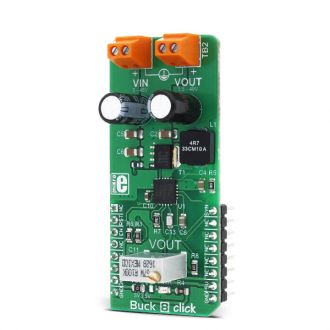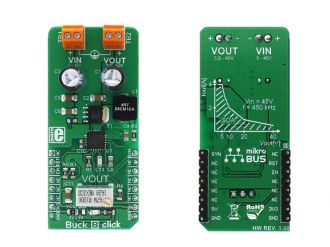
We strongly encourage users to use Package manager for sharing their code on Libstock website, because it boosts your efficiency and leaves the end user with no room for error. [more info]

Rating:
Author: MIKROE
Last Updated: 2018-05-17
Package Version: 1.0.0.0
mikroSDK Library: 1.0.0.0
Category: Buck
Downloaded: 4980 times
Not followed.
License: MIT license
Buck 8 click is a high efficiency, wide voltage range, and high current synchronous step down (buck) DC-DC converter, featuring two enhanced modes used to drive lighter loads with increased efficiency. The output voltage can be adjusted by the multi-turn trimmer potentiometer.
Do you want to subscribe in order to receive notifications regarding "Buck 8 Click" changes.
Do you want to unsubscribe in order to stop receiving notifications regarding "Buck 8 Click" changes.
Do you want to report abuse regarding "Buck 8 Click".


Library Description
The library carries functions related to GPIO pins control of the Buck 8 click. PWM control is not part of the library and should be initialized depending on the development system.
Key functions:
Examples Description
The demo application is composed of three sections:
void applicationTask()
{
if( buck8_getState() && flag == 0)
{
mikrobus_logWrite("max range ",_LOG_LINE);
flag = 1;
}
else
{
flag = 0;
}
Delay_1sec();
}
Other MikroElektronika libraries used in the example:
Additional notes and information
Depending on the development board you are using, you may need USB UART click, USB UART 2 click or RS232 click to connect to your PC, for development systems with no UART to USB interface available on the board. The terminal available in all MikroElektronika compilers, or any other terminal application of your choice, can be used to read the message.